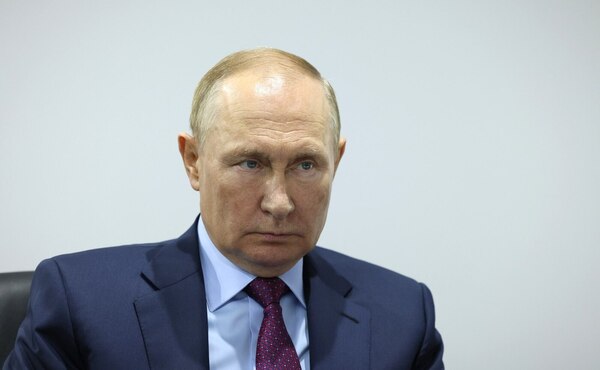Don’t Psychoanalyze Putin
March 23, 2023
Growing criticism from American conservatives of the U.S. role in supporting Ukraine is largely based on views what we think Putin’s real interests are, and not on his record.
Take, for example, American army veteran and columnist, Kurt Schlichter, in Townhall:
… this territorial dispute – which it is – is not a vital American interest that overcomes other priorities and that is worth endless treasure and maybe even blood. We generally hope Ukraine wins, but this is not our fight.
Schlichter’s opinion is shared by others with greater influence. Florida Governor Ron DeSantis, echoing the territorial dispute notion, says that the fate of Ukraine is not a vital U.S. interest, and South Dakota governor Kristi Noem and Missouri Senator Josh Hawley think efforts in Ukraine weaken our strength versus China. In other words, the critics for the most part are not strict isolationists but view support of Ukraine as undermining our ability to confront our chief challenger on the world stage: China. Schlichter believes Putin has a vital interest in keeping the Chinese from invading Russia’s resource-rich land of Siberia to its north. Thus, he sees the potential for bringing Putin to our side, balancing China.

There are a few problems with this. First, since when is a conflict where one side has made no secret of its intention to swallow up another “a territorial dispute”?
Second it ignores Putin’s stated motivations. Putin has made it clear that his aims go beyond Ukraine, that he views the collapse of the Soviet empire as “the greatest geopolitical catastrophe of the century” and that he sees his mission as restoring Russia’s territorial reach. He had taken chunks of neighboring Georgia (2008) before doing the same to Ukraine in 2014. A secret plan drawn up by Russia’s security service, the FSB, obtained and disclosed by a consortium of media, lays out detailed options to destabilize Moldova – including supporting pro-Russian groups, utilizing the Orthodox Church and threatening to cut off supplies of natural gas.
Third, Putin is not a man of his word. He assured Ukraine he would not invade. Then he invaded. Russia violated the Intermediate Range Nuclear Missile Treaty with the USA. Also Russia signed a nuclear arms treaty with the U.S. and then forbade inspections.
So how limited are Putin’s aims? Does he only want the eastern part of Ukraine? Or perhaps all of Ukraine? Or would he stop after reconstituting the old borders of the Soviet Union? Or worst scenario, could he join China and attack the United States?
Critics of American support for Ukraine might say we lived with the Soviet Union in its old, expanded borders—it’s no serious concern of ours if Putin restores them.
Some arguments we hear today echo of a different debate in the 1930s. British Prime Minister, Neville Chamberlain, said this:
How horrible, fantastic, incredible it is that we should be digging trenches and trying on gas masks here because of a quarrel in a faraway country between people of whom we know nothing.
At that time many argued that Hitler was a natural ally of the West against Russian Communism. It made sense, but it didn’t work that way.
It is argued that we alienated Putin by bringing NATO to his borders. But the countries on Russia’s borders originally asked to be admitted to NATO.
Despite belonging to NATO, the Baltic countries, Lithuania, Estonia and Latvia, formerly incorporated into the Soviet Union, openly fear they could be Putin’s next targets if he succeeds in Ukraine.
Those who dismiss threat of Russian-Iranian-Chinese axis can raise more points that have a certain logic. Isn’t Putin worried about Iran and its Islamic extremism given that his own country has about 20 million Muslims? Isn’t Putin worried about his giant neighbor China, which just recently took over 1000 km of India and also militarized the South China Sea?
Again, what makes sense to us might not make sense to foreign dictators. There are warnings – Russia is in our hemisphere. It has sent troops to Venezuela in support of communist dictator Nicolás Maduro, and has been invited by another communist dictator, Daniel Ortega, to send troops to Nicaragua.
In 2021 Japan’s number two defense official told the Hudson Institute that China and Russian activities in the Pacific implied a plan to launch a Pearl Harbor-style attack on the U.S., similar to what Japan did on Dec. 7, 1941, propelling the U.S. into World War II.
But we have nuclear missiles on bombers, submarines, and in missile silos. So surely we don’t really have worry about either China or Russia?
According to Defense News a first strike by either or both of them is unlikely:
To conduct a nuclear first strike, Russia or China would need enough missiles to cripple all land-based U.S. weapons and locate and destroy all U.S. ballistic missile submarines, or at least enough to mitigate retaliatory casualties to a still unacceptable 10-20 million. While possible, this would entail a massive expansion in both states’ nuclear arsenals. More reasonable is the proposition that China and Russia would use hypersonic-equipped ICBMs to raise the stakes of a response to regional aggression. Would a president trade a U.S. population center to honor a commitment to the existence of an ally or critical partner?
That first strike may not be unthinkable. China is expanding its nuclear arsenal at a dramatic rate. Russia has withdrawn from a nuclear treaty. U.S. military commanders and experts are sounding warnings about the buildup of Russian submarines off American coasts.
Edmund Burke, a British sympathizer with the American revolution of 1776, said this: “There is no safety for honest men except by believing all possible evil of evil men.” We cannot assume foreign dictators think like we would in their shoes.
Greg Irwin is a pen name.
Photo credit: Office of the president of Russia
If you experience technical problems, please write to helpdesk@americanthinker.com
FOLLOW US ON
This article has been archived for your research. The original version from American Thinker can be found here.



